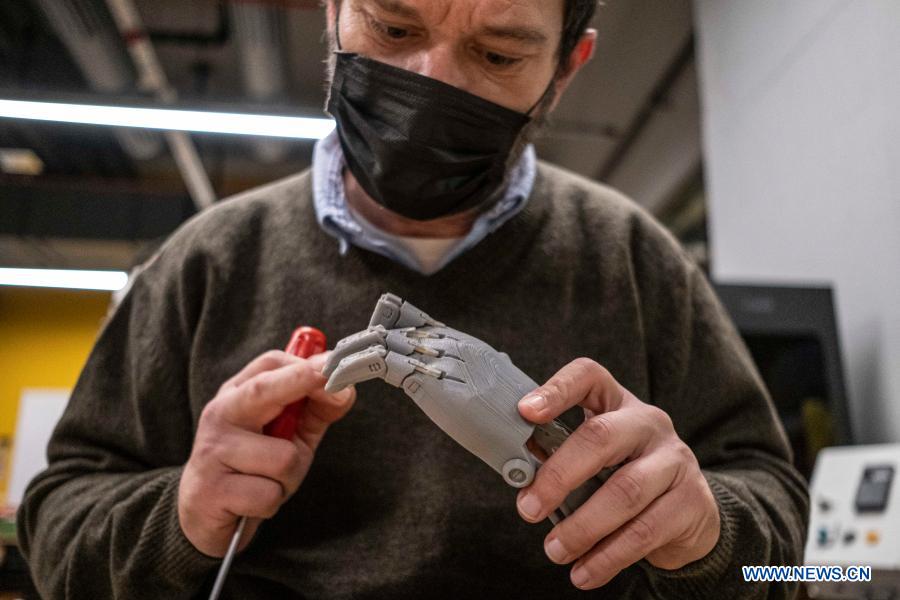
Co-founder of Robohand Turkey Association Hakan Pakten adjusts an artificial hand in Istanbul, Turkey on Jan. 13, 2021. (Photo by Osman Orsal/Xinhua)
ISTANBUL, Jan. 14 (Xinhua) -- A Turkish charity makes a difference and puts a long-lasting smile on the faces of children with limb deformity, designing and printing low-cost mechanical hands and arms for them using 3D printers.
The Robohand Turkey Association or Robotel Turkiye Dernegi in Turkish, based in Istanbul, the country's finance and technology hub, has been "touching people's lives and hearts" since it was founded by Zeynep Karagoz and a few close friends in 2014.
"When we first started, few people were aware of the 3D printing technology," Karagoz, who is an architect and chairwoman of the non-profit organization, told Xinhua.
The group first printed a mechanical hand in 2014 for 18-year-old Mehmet Ali Toprak, who lost four fingers in an accident while working for a printing company.
Karagoz and her friends got their inspiration from a global volunteer movement "Enabling the Future," which provides an alternative to a prosthesis, enabling children with limb deformity to have a more comfortable life.
"I wanted to do the same in my country with custom-made and low-cost robotic limbs and reach to children and families traumatized by a missing part," explained Karagoz.
Karagoz and other volunteers published the process of fitting children with new hands and saw a growing demand for the custom-made limbs across Turkey.
"Until now, we have created over a hundred hands for children in need, and over a hundred others are currently in line to get one fitted in time," she explained, remarking that the COVID-19 pandemic proved to be challenging for their work.
Robotel's network spread nationwide in time with a total of 3,000 volunteers who also help to join together the hands printed in parts.
The printed hands, free of charge, are created in accordance with the users' wishes and can be inspired by their favorite superhero characters, such as Batman or Iron Man, and there is no limit to the palette of colors.
Children born with organ deformities cannot have bionic prosthetic limb implants until the age of 18. Robotic hands offer them an opportunity to carry out simple daily activities, like playing, riding a bicycle, or eating, said Karagoz.
And the 3D printed hands cost only a fraction of a bionic prosthesis.
"An electronic bionic hand can cost 10,000 to 20,000 U.S. dollars, while we create our hands at under 50 Turkish liras or 6.5 dollars," indicated Karagoz, noting that as the children grow, they also need their hands to be reprinted almost every year.
The new hand boosts the children's self-esteem and helps them socialize, according to Karagoz.
"The feeling you get when you see a child when they leave our workshop with a smile on their faces is priceless," she noted, stressing that it doesn't take to be a technology buff or a 3D printing expert to be a volunteer for her organization.
"Everyone can be a volunteer for our association, you can print billboards or simply convey our message," she added. Enditem




